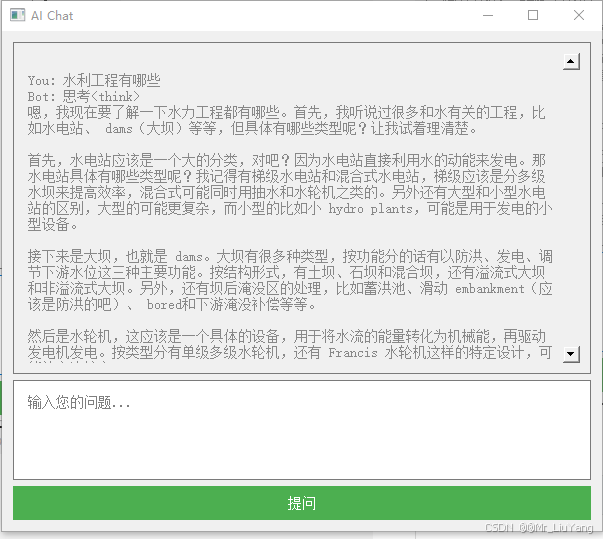如何用Python调用本地模型实现DeepSeek提示词模板:一步步教你高效解决13种应用场景
从零到一:纯代码联合PyQt5、Ollama、Deepseek打造简易版智能聊天助手
用外接知识库武装大模型:基于Deepseek、Ollama、LangChain的RAG实战解析
纯代码实战–用Deepseek+SQLite+Ollama搭建数据库助手
概要
本文介绍基于PyQt5框架与Ollama大语言模型搭建的智能对话系统。通过QT实现简易的GUI界面,结合多线程技术实现AI模型的异步调用,支持流式响应输出。项目实现了类ChatGPT的交互体验,具有实时对话、流式响应、错误处理等核心功能。
提示:完整代码看最后,复制后可直接运行
整体架构流程
- 界面层:采用PyQt5构建聊天窗口框架
- 逻辑层:通过QThread实现异步调用
- 模型层:对接Ollama本地大模型服务
- 数据流:用户输入→界面展示→后台处理→流式输出
代码模块详解
AIWorker: 模型调用与流式处理
ChatWindow:界面管理与用户交互
StyleSheet:界面美化配置
- 导入模块
import sys
from PyQt5.QtWidgets import QApplication, QWidget, QVBoxLayout, QTextEdit, QPushButton
from PyQt5.QtCore import Qt, QThread, pyqtSignal
from ollama import chat
sys 用于处理程序的命令行参数。
PyQt5.QtWidgets 提供了图形用户界面组件,如 QApplication、QWidget、QVBoxLayout、QTextEdit、QPushButton 等。
PyQt5.QtCore 提供了核心功能,如 QThread(用于后台线程)和 pyqtSignal(用于信号与槽机制)。
ollama.chat 用于与AI模型进行交互。
2、AIWorker 类
class AIWorker(QThread):
update_signal = pyqtSignal(str)
AIWorker 继承自 QThread,用于在后台线程中运行与AI模型的对话。
update_signal 是一个自定义信号,用于将AI模型的响应传递回主线程。
def __init__(self, user_input):
super().__init__()
self.user_input = user_input
构造函数接受用户输入并初始化线程。
def run(self):
try:
stream = chat(
model='deepseek-r1:7b',
messages=[{'role': 'user', 'content': self.user_input}],
stream=True,
)
for chunk in stream:
content = chunk['message']['content']
self.update_signal.emit(content)
except Exception as e:
self.update_signal.emit(f"\n[Error] {str(e)}")
run 方法在后台线程中执行,发送用户输入到AI模型并接收模型的流式输出。
stream 为一个迭代器,逐步接收AI模型的响应。
如果有异常,错误消息将通过信号发送回主线程。
3、ChatWindow 类
class ChatWindow(QWidget):
def __init__(self):
super().__init__()
self.init_ui()
self.ai_thread = None
ChatWindow 类继承自 QWidget,表示聊天窗口的主界面。
ai_thread 用于存储后台执行的AI线程。
3.1界面初始化
def init_ui(self):
self.setWindowTitle("AI Chat")
self.setGeometry(100, 100, 600, 500)
layout = QVBoxLayout()
设置窗口标题和大小。
使用 QVBoxLayout 垂直布局组件。
self.chat_display = QTextEdit()
self.chat_display.setReadOnly(True)
self.chat_display.setStyleSheet("""
background-color: #f0f0f0;
font-size: 14px;
padding: 10px;
""")
chat_display 用于显示聊天内容,设为只读模式。
使用CSS样式来定制文本框的外观。
self.input_area = QTextEdit()
self.input_area.setMaximumHeight(100)
self.input_area.setPlaceholderText("输入您的问题...")
self.input_area.setStyleSheet("""
background-color: white;
font-size: 14px;
padding: 10px;
""")
input_area 用于用户输入消息。
设置最大高度并添加占位符文本。
self.send_btn = QPushButton("提问")
self.send_btn.setStyleSheet("""
QPushButton {
background-color: #4CAF50;
color: white;
border: none;
padding: 10px;
font-size: 14px;
}
QPushButton:hover { background-color: #45a049; }
""")
self.send_btn.clicked.connect(self.send_message)
send_btn 是一个按钮,点击时会调用 send_message 方法发送消息。
使用CSS样式定制按钮外观。
layout.addWidget(self.chat_display)
layout.addWidget(self.input_area)
layout.addWidget(self.send_btn)
self.setLayout(layout)
添加聊天框、输入框和按钮到布局中,并将布局设置为窗口的布局。
3.2 发送消息
def send_message(self):
user_input = self.input_area.toPlainText().strip()
if not user_input:
return
获取用户输入的文本,如果输入为空,则直接返回。
self._append_message("You", user_input)
self.input_area.clear()
将用户输入的消息添加到聊天显示框中,并清空输入框。
self._append_message("Bot", "思考中...", is_streaming=True)
在聊天显示框中显示“思考中…”以提示用户AI正在生成回应。
self.ai_thread = AIWorker(user_input)
self.ai_thread.update_signal.connect(self.update_bot_response)
self.ai_thread.finished.connect(self.finalize_response)
self.ai_thread.start()
创建并启动一个 AIWorker 线程处理AI响应。
update_signal 连接到 update_bot_response 方法,用于更新聊天框内容。
finished 信号连接到 finalize_response 方法,确保在响应完成后进行处理。
3.3 更新聊天显示
def _append_message(self, sender, message, is_streaming=False):
cursor = self.chat_display.textCursor()
cursor.movePosition(cursor.End)
_append_message 方法用于将消息插入到 chat_display 中。
设置光标位置到文本末尾,确保新消息被添加到显示区的底部。
if sender == "You":
prefix = "\nYou: "
color = "#333333"
else:
prefix = "\nBot: "
color = "#2196F3" if not is_streaming else "#888888"
为不同发送者(用户和Bot)设置不同的颜色和前缀。
cursor.insertText(prefix)
cursor.insertHtml(f'<span style="color:{color}">{message}</span>')
self.chat_display.ensureCursorVisible()
将消息插入到文本框中,并确保光标可见。
3.4 更新Bot的响应
def update_bot_response(self, content):
current_text = self.chat_display.toPlainText()
if current_text.endswith("思考中..."):
self.chat_display.setPlainText(current_text[:-4] + content)
else:
cursor = self.chat_display.textCursor()
cursor.movePosition(cursor.End)
cursor.insertText(content)
self.chat_display.ensureCursorVisible()
当接收到Bot的流式内容时,更新显示区。
如果当前显示的是“思考中…”,则将其替换为实际响应。
3.5 完成响应
def finalize_response(self):
current = self.chat_display.toPlainText()
if not current.endswith("\n"):
self.chat_display.append("")
确保聊天显示区的最后一行有换行符,避免显示不完整。
搭建后示例如:

待改进
| 存在问题 |
|---|
| 透明字体不清晰 |
| 点击提问后聊天窗口跳转至首行 |
| 历史记录保存 |
| 多模型切换 |
完整代码
提示:pyQt5需通过pip自行安装 Deepseek预训练模型下载见本人上篇博客:https://blog.youkuaiyun.com/qq_36112576/article/details/145510585?spm=1001.2014.3001.5502 一、2模型下载部分
代码中model='deepseek-r1:7b’根据个人情况自行替换
import sys
from PyQt5.QtWidgets import QApplication, QWidget, QVBoxLayout, QTextEdit, QPushButton
from PyQt5.QtCore import Qt, QThread, pyqtSignal
from ollama import chat
# AIWorker类,继承自QThread,用于在后台线程中处理与AI的交互
class AIWorker(QThread):
# 自定义信号,用于更新UI上的聊天内容
update_signal = pyqtSignal(str)
def __init__(self, user_input):
super().__init__()
# 接收用户输入,准备与AI进行对话
self.user_input = user_input
def run(self):
try:
# 使用Ollama API与AI模型进行对话,启动流式响应
stream = chat(
model='deepseek-r1:7b',
messages=[{'role': 'user', 'content': self.user_input}],
stream=True,
)
# 遍历返回的流式数据,逐块接收消息
for chunk in stream:
content = chunk['message']['content']
# 将接收到的内容通过信号发射到UI
self.update_signal.emit(content)
except Exception as e:
# 如果出现异常,将错误信息通过信号发射
self.update_signal.emit(f"\n[Error] {str(e)}")
# 主聊天窗口类
class ChatWindow(QWidget):
def __init__(self):
super().__init__()
# 初始化UI界面
self.init_ui()
self.ai_thread = None
def init_ui(self):
self.setWindowTitle("AI Chat") # 设置窗口标题
self.setGeometry(100, 100, 600, 500) # 设置窗口初始大小与位置
layout = QVBoxLayout() # 创建垂直布局
# 创建聊天显示框,设置为只读,方便显示聊天内容
self.chat_display = QTextEdit()
self.chat_display.setReadOnly(True)
self.chat_display.setStyleSheet("""
background-color: #f0f0f0;
font-size: 14px;
padding: 10px;
""")
# 创建输入框,用户输入消息
self.input_area = QTextEdit()
self.input_area.setMaximumHeight(100)
self.input_area.setPlaceholderText("输入您的问题...")
self.input_area.setStyleSheet("""
background-color: white;
font-size: 14px;
padding: 10px;
""")
# 创建发送按钮,点击时发送消息
self.send_btn = QPushButton("提问")
self.send_btn.setStyleSheet("""
QPushButton {
background-color: #4CAF50;
color: white;
border: none;
padding: 10px;
font-size: 14px;
}
QPushButton:hover { background-color: #45a049; }
""")
self.send_btn.clicked.connect(self.send_message) # 点击按钮时调用send_message
# 将组件添加到布局中
layout.addWidget(self.chat_display)
layout.addWidget(self.input_area)
layout.addWidget(self.send_btn)
self.setLayout(layout)
def send_message(self):
# 获取用户输入的文本并去掉空白
user_input = self.input_area.toPlainText().strip()
if not user_input:
return # 如果输入为空,返回
# 在聊天窗口中显示用户输入的消息
self._append_message("You", user_input)
self.input_area.clear() # 清空输入框
# 在聊天窗口中显示“思考中...”提示
self._append_message("Bot", "思考中...", is_streaming=True)
# 启动后台线程,处理与AI的对话
self.ai_thread = AIWorker(user_input)
# 连接信号和槽函数,更新聊天内容
self.ai_thread.update_signal.connect(self.update_bot_response)
# 连接线程完成后的槽函数
self.ai_thread.finished.connect(self.finalize_response)
# 启动线程
self.ai_thread.start()
def _append_message(self, sender, message, is_streaming=False):
# 获取文本光标,确保内容插入到聊天窗口的末尾
cursor = self.chat_display.textCursor()
cursor.movePosition(cursor.End)
# 设置消息的前缀和颜色,用户消息和机器人消息区分开
if sender == "You":
prefix = "\nYou: "
color = "#333333" # 用户消息颜色
else:
prefix = "\nBot: "
color = "#2196F3" if not is_streaming else "#888888" # 机器人消息颜色,正在处理时颜色较灰
# 插入消息
cursor.insertText(prefix)
cursor.insertHtml(f'<span style="color:{color}">{message}</span>')
# 确保文本框显示最新内容
self.chat_display.ensureCursorVisible()
def update_bot_response(self, content):
# 如果聊天框正在显示“思考中...”提示,则替换为实际响应内容
current_text = self.chat_display.toPlainText()
if current_text.endswith("思考中..."):
self.chat_display.setPlainText(current_text[:-4] + content)
else:
# 否则直接插入新的消息
cursor = self.chat_display.textCursor()
cursor.movePosition(cursor.End) # 确保插入文本到末尾
cursor.insertText(content) # 插入文本
self.chat_display.ensureCursorVisible()
def finalize_response(self):
# 确保最后有换行符,使聊天内容整洁
current = self.chat_display.toPlainText()
if not current.endswith("\n"):
self.chat_display.append("")
# 主程序入口
if __name__ == "__main__":
app = QApplication(sys.argv) # 创建应用程序
window = ChatWindow() # 创建聊天窗口实例
window.show() # 显示窗口
sys.exit(app.exec_()) # 进入应用的主循环






















 3067
3067

 被折叠的 条评论
为什么被折叠?
被折叠的 条评论
为什么被折叠?








